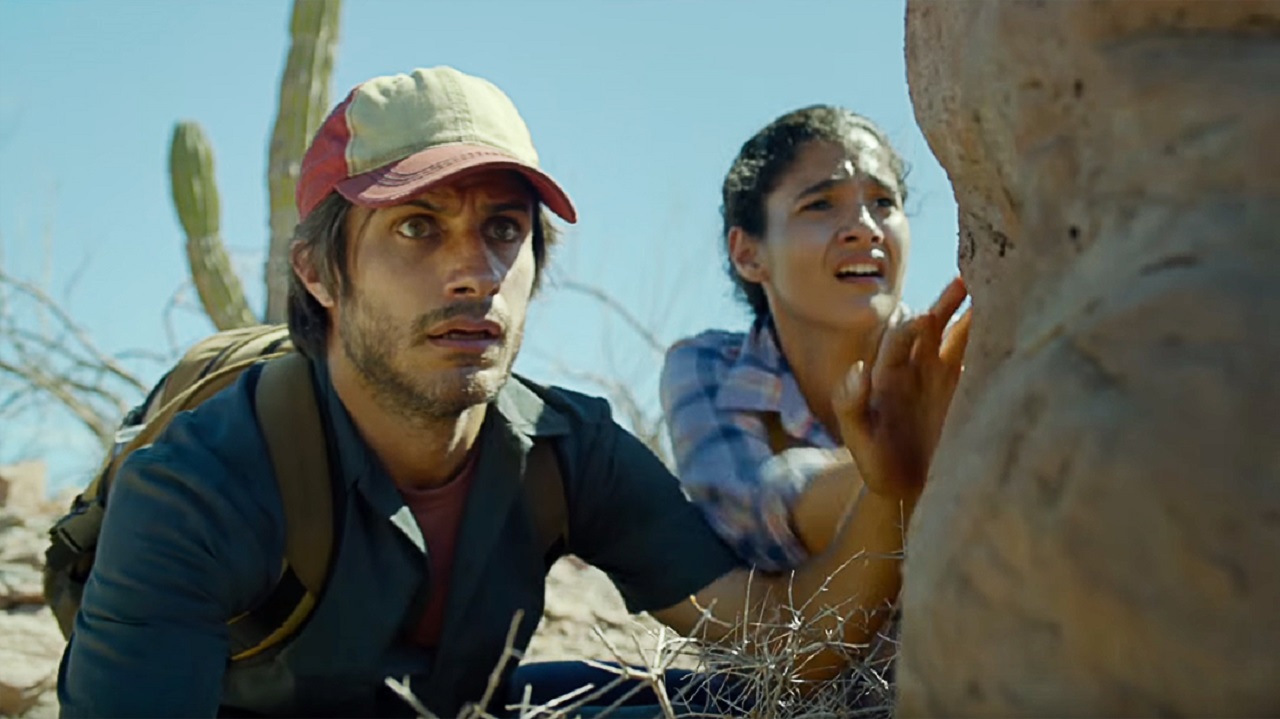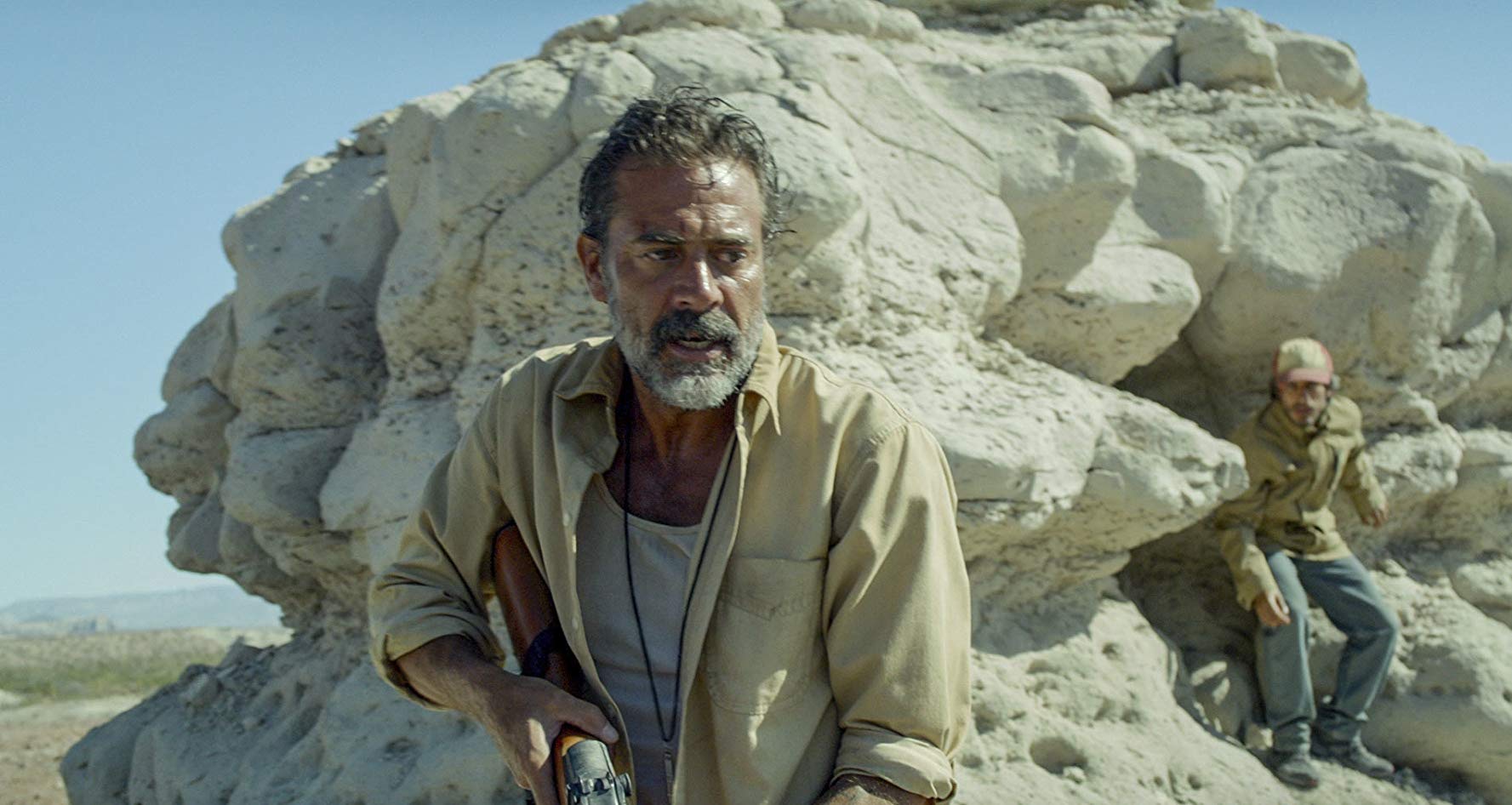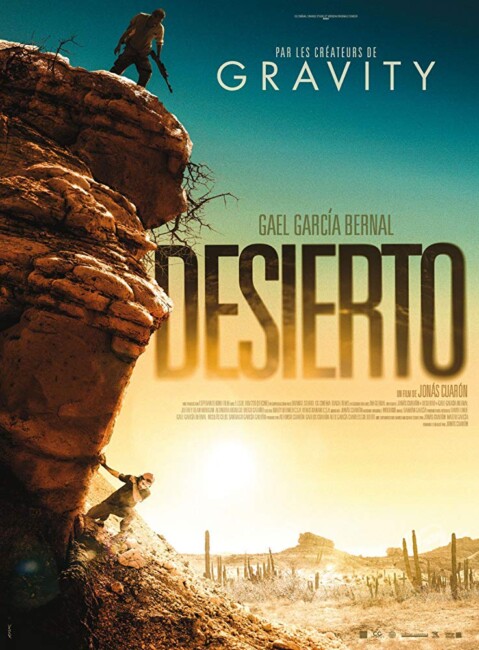France/Mexico. 2015.
Crew
Director – Jonas Cuaron, Screenplay – Jonas Cuaron & Mateo Garcia, Producers – Alfonso Cuaron, Carlos Cuaron, Jonas Cuaron, Alex Garcia & Charles Gillibert, Photography – Damian Garcia, Music – Woodkid, Visual Effects Supervisor – Anthony Lemestreau, Art Direction – Alejandro Garcia Castro. Production Company – Esperanto Kino/Orange Studio/CG Cinema/Itaca Films/IM Global.
Cast
Gael Garcia Bernal (Moises), Jeffrey Dean Morgan (Sam), Alondra Hidalgo (Adela), Diego Cataño (Mechas), Marco Perez (Lobo), David Peralta Arreola (Ulises), Oscar Flores Guerrero (Ramiro), Erik Vazquez (Coyote), Lew Temple (Border Patrol)
Plot
A truck transporting a group of Mexicans so they can illegally cross the US border breaks down in the desert. The group have no choice but to continue on foot, even though the guide does not like having to travel through the badlands. As they cross into the US, the group are spotted by Sam, a white American vigilante. Using his tracking dog and a telescopic rifle, Sam kills various of the group. A handful of stragglers get away but, as Sam begins a determined pursuit, they have nothing to defend themselves but their bare hands.
Desierto was the first commercially released directorial film from Mexican-born Jonas Cuaron. Jonas is son of the more well-known Alfonso Cuaron, director of Children of Men (2006) and Gravity (2013), among others. Jonas had made his directorial debut with the arts release Year of the Nail (2007), a film that only consists of still photographs and dialogue. Jonas gained higher profile as co-writer of his father’s Gravity and as director of Aningaaq (2013), a seven-minute short film that was designed as companion piece to Gravity. Desierto, his first full film, is a family affair with both Alfonso and Jonas’s uncle Carlos having signed on as producers. Jonas subsequently went on to direct Chupa (2023) about kids befriending a baby chupacabra.
With Desierto, Jonas Cuaron tackles a big theme – that of illegal immigration to the USA by Mexicans. It is such a contentious and politically charged issue that Cuaron had to make the film outside the US – he shoots in the Baja Desert, while the financing comes from Mexican and principally French sources. Few other films have found the cojones to take on the vexatious issue of Mexican illegals and cross-border smuggling – Babel (2006) and Crossing Over (2009) merely dipped their toes in the water. It is however a subject that the horror film seems unafraid of with the previous the US-made Undocumented (2010), which has many similarities to Desierto in its theme of Mexicans being targeted by white vigilantes, and the subsequent Beneath Us (2019) with Mexican day laborers being tortured by entitled white people.
Not too surprisingly, Jonas Cuaron sides with the Mexicans. They are the only sympathetic characters in the film and their journey is automatically seen as just – beyond Gael Garcia Bernal’s desire to be reunited with his son, we are given no reasons for their decision to be engaged in what is after all an illegal act. On the other side of the coin, Jeffrey Dean Morgan, the only of two white characters on screen, is seen as representative of a rednecked intolerance, but equally is given no motivation or characterisation beyond having a desire to hunt and kill Mexicans. In other words, the characters are in effect straw figures designed to represent the two opposing sides of an issue.

Jonas Cuaron desires to tackle a big issue but the fault of Desierto is that he only does so in inflammatory terms. This is a film that concerns itself less with the social and economic reasons that people smuggle across the border, which is what intrigued me, as it immediately zeroes in on a certain breed of vigilante that has popped up in real life in recent years, taking the law into their own hands to patrol border areas of Arizona and Texas for any cross-border interlopers.
So far there are no records of any of these vigilantes killing Mexicans but given the enthusiasm with which Donald Trump’s idea of a wall was greeted, it is surely only a matter of time. (Desierto premiered three months after Trump made his famous wall speech). In that Desierto depicts something that is fictional (as opposed to offering a portrait of the realities of illegal immigration), then surely it must be regarded as conflating the politics of the situation into what can only be seen as a straw argument.
Essentially, Jonas Cuaron offers us up The Most Dangerous Game (1932) with a political agenda. The film’s message is not particularly profound and you grasp it from the moment you read the film’s premise. The rest of Desierto trades on the basics of the oft-filmed Most Dangerous Game scenario – see my essay Films About Human Bloodsports and Death Games for a more detailed discussion – a group of unarmed individuals in a desperate survival run through the wilderness against a lone hunter equipped with a rifle and dog, where despite everything stacked against them they manage to turn the tables with only their bare hands to rely on.

As such, Jonas Cuaron offers up a generally taut and tense thriller. There are no interior scenes and the film creates a great sense of the characters struggling to survive in a harsh landscape. On the other hand, the criticism I would make is that Cuaron never goes much beyond that. There is never the sense he pushes either the fight between Gael Garcia Bernal and Jeffrey Dean Morgan to a primal struggle for life or death – it is just two men hiding around a rock and scuffling in the loose shale for the rifle – or the sense that we get in some of the really good survival thrillers where every tiny action becomes a key hope or hurdle to survival.
This is a film that could have become a great movie had the tension been ratcheted up by several degrees. As it is, it is effective but so thinly drawn – in terms of the essentially blank characters and their drives, in the whittled-down bare bones plot or in tension set-pieces – that it emerges on the slight side. It is a film where it is the charged politics of the premise that drive it but nothing too much beyond that.
Trailer here

